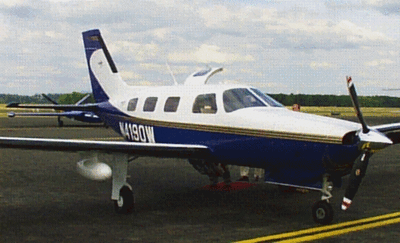Aero-Tips!
A good pilot is always learning -- how many times have you heard
this old standard throughout your flying career? There is no truer
statement in all of flying (well, with the possible exception of
"there are no old, bold pilots.")

Aero-News has called upon the expertise of Thomas P. Turner,
master CFI and all-around-good-guy, to bring our readers -- and us
-- daily tips to improve our skills as aviators. Some of them, you
may have heard before... but for each of us, there will also be
something we might never have considered before, or something that
didn't "stick" the way it should have the first time we memorized
it for the practical test.
Look for our daily Aero-Tips segments, coming each day to you
through the Aero-News Network.
Aero-Tips 09.19.06
A recent press report describes an accident in Mexico. A
six-passenger Piper Malibu crashed after its pilot reported engine
trouble. The article says two aboard the PA-46 died, and five
others were hospitalized.

Wait a minute -- that's seven people on the six-passenger
airplane.
None was an infant in someone's arms, either. The news item says
one of the survivors reports "the plane was only supposed to carry
six people, but that he and his friends convinced the pilot to take
on an extra passenger."
Load alone would not have caused an engine failure, unless it
resulted from exhausting a fuel load reduced to compensate. But
undoubtedly the weight would have reduced glide performance and
made control more difficult after the engine quit. Distribution of
the weight may have also reduced control authority. The extra
passengers (and their bags) might have made a difference in the
outcome (this is mere speculation at this point). But why would any
pilot allow him/herself to get talked into putting passengers (and
themselves) at this unnecessary added risk?
The resigned pilot
The FAA identifies the fifth "hazardous attitude" as that of
resignation-a pilot's feeling that he or she can't wholly control
the outcome of a trip or must defer decisions to others. "It
doesn't matter what I do," the resigned pilot sighs; it's hard for
someone exhibiting this personality trait to stand up against
someone who wants to buck the rules. This attitude is especially
prevalent in some small air cargo operations, corporate flights
with the company owner on board (especially if the plane's small
enough there's no door between cabin and cockpit), and in charter
flying. Someone in authority (i.e., paying the bills and/or
permitting a pilot to build desirable flying time) says "just
another bag" or "one more person" or "if you won't fly when you're
tired or in a little bad weather, I'll find someone who will" and
the resigned pilot throws up his/her hands and straps in.
Is there good in resignation?
In the other four "hazardous" pilot attitudes -- anti-authority,
impulsiveness, invulnerability and machismo -- we are able to
easily find examples where the attitude can also be an asset. It's
harder to find the good in pilot resignation. If a pilot should be
resigned about any one thing, it's a realization that he/she will
never know everything about aviation, and therefore that there's a
lesson to be learned from every flight, every regulation, and every
other pilot. If we "resign" ourselves to a lifetime of having to
learn even more to be a completely competent and safe pilot,
perhaps we can get some good out of this one aspect of an otherwise
extremely hazardous attitude.
Aero-tip of the day: Resign yourself to a
lifetime of practice and study. What you do as a pilot does make a
difference, and it's your job as a professional pilot (whether or
not you're being paid to fly) to make command decisions that affect
safety.
 ANN's Daily Aero-Term (04.20.24): Light Gun
ANN's Daily Aero-Term (04.20.24): Light Gun Aero-News: Quote of the Day (04.20.24)
Aero-News: Quote of the Day (04.20.24) ANN's Daily Aero-Linx (04.21.24)
ANN's Daily Aero-Linx (04.21.24) Aero-News: Quote of the Day (04.21.24)
Aero-News: Quote of the Day (04.21.24) ANN's Daily Aero-Term (04.21.24): Aircraft Conflict
ANN's Daily Aero-Term (04.21.24): Aircraft Conflict




